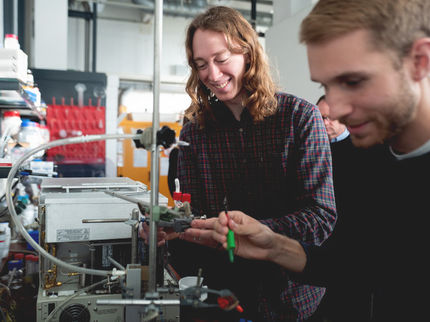A better alternative to gasoline
Cost-saving measure to upgrade ethanol to butanol
Advertisement
Scientists reported a discovery that could speed an emerging effort to replace ethanol in gasoline with a substantially better fuel additive called butanol, which some experts regard as "the gasoline of the future."
Duncan Wass explained that ethanol has become a leading biofuel — millions of gallons added to gasoline around the country each year — despite several disadvantages. Ethanol, for instance, has a lower energy content per gallon than gasoline, which can reduce fuel mileage. Ethanol also has a corrosive effect on car engines and can't easily be used in amounts higher than 10-15 percent.
"Ethanol actually is a poor alternative fuel," Wass said. "Butanol is much better. It contains about 30 percent more energy per gallon than ethanol, is easier to handle and more of it can be blended into each gallon of gasoline. In fact, you could fuel a car on pure butanol and it would run absolutely fine. That's the basis for butanol's emerging reputation as 'the gasoline of the future.'"
Efforts already have begun to convert some ethanol factories in the Corn Belt to production of butanol, Wass explained. Those factories currently process corn into alcohol with the same fermentation technology used to make beer and beverage alcohol. Converting those factories to ferment corn into butanol would require costly modifications, estimated at $10 million-$15 million for a typical plant.
Wass and his group at the University of Bristol in the U.K. are reporting the discovery of a new family of catalysts that could enable those factories to continue producing ethanol, with the ethanol then converted into butanol. With the catalysts, ethanol factories would require less retrofitting to produce butanol. Catalysts speed up chemical reactions by lowering the amount of energy needed need to jumpstart reactions. They enable production of hundreds of everyday products, and many of the proteins that sustain life are catalysts called enzymes.
"These new catalysts are much better than any previously in existence," Wass said. "There's a long way to go before they are commercialized, but we are reporting a fundamental advance in that direction. Quite simply, they are the world's best catalysts for making the gasoline of the future."
The new catalysts are more selective, solving a difficult problem in which current catalysts churn out butanol as well as unwanted products. Wass said the new catalysts yield 95 percent butanol out of the total products from each batch in laboratory-scale tests.





























































